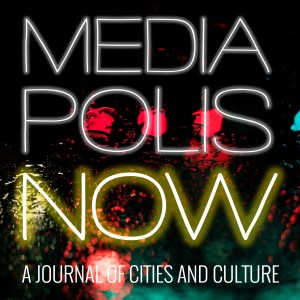
945
Downloads
16
Episodes
Mediapolis Now is the podcast channel of Mediapolis: A Journal of Cities and Culture. Like its parent journal, our podcast puts media and the city into conversation. We are interested in how scholars, artists and other practitioners see the practices, rhythms and motilities of the city through patterns of media use, exposure and desire; and who approach media forms, representations, infrastructures and industries as intrinsic aspects of urban living. Our channel hosts three series, all exploring the junction of cities, culture and media: Voices, in which we interview thinkers and practitioners about their work; Essays, featuring audio readings of selected Mediapolis articles; and Events, audio recordings of recent talks and symposia. Audio Editor: Scott Rodgers Visit the Mediapolis journal website: https://www.mediapolisjournal.com/
Episodes

Thursday Apr 29, 2021
Shannon Mattern on '5000 Years of Urban Media'
Thursday Apr 29, 2021
Thursday Apr 29, 2021
This is a repost of Mack Hagood’s conversation with Shannon Mattern in 2017 on her book Code and Clay, Data and Dirt: Five Thousand Years of Urban Media. When it was first published, it was the first audio interview to appear on Mediapolis. It was also a preview of the podcast Phantom Power: Sounds about Sound, co-hosted by Hagood with poet and media artist cris cheek in 2018. This episode was written, edited and musically scored by Hagood. Special thanks to Orfeas Skutelis at the New School for his production assistance. [Disclosure: Mattern served at the time on the Mediapolis advisory board]
Interview summary:
Media archeology is a field that attempts to understand new and emerging media by examining old and often dead media technologies. Shannon Mattern takes inspiration from the field but notes that most of its “digging in the past” is metaphorical. “What if we took media archeology literally,” she writes, “and borrowed a few tricks from archeologists of the stones-and-bones variety?” Her book Code and Clay, Data and Dirt, released in November 2017 by University of Minnesota Press, pushes us in that direction.
Each chapter moves us farther back in time in an examination of old urban media infrastructures, starting with the sonic technologies of the telegraph and radio, then moving to the urban emplacement of the printing press, followed by an examination of the earliest surfaces for writing—clay and stone—and finally, perhaps the oldest medium of them all, the human voice. Each of these media reorganized the city around itself and each of them is still with us today, as past and future media co-mingle in the present. – Mack Hagood, www.phantompod.org

Wednesday Apr 14, 2021
Wednesday Apr 14, 2021
In this episode of the Mediapolis Now Voices series, we speak with Zlatan Krajina and Deborah Stevenson. Zlatan is based at the University of Zagreb, in Croatia, where he is Assistant Professor of Media Studies. His work has focused on urban screens, media and everyday life and qualitative methodologies. Deborah is based at Western Sydney University, in Australia, where she is Professor of Sociology and Urban Cultural Research. Her work has centred on cities and urban life, arts and cultural policy, and gender in relation to cultural production and consumption.
Together, Zlatan and Deborah are co-editors of the Routledge Companion to Urban Media and Communication. Published in 2019, it is a book that was the result of a multi-year process. Its resulting 44 chapters are notably wide ranging, taking in the urban-mediated dimensions of everything from architecture, infrastructure, digitalisation and regeneration to globalisation, identity, consumption and branding.
Our discussion not only centred on the Companion itself, but the lens it provides onto the processes and tensions of academic knowledge production in a fast-changing and interdisciplinary research area. Throughout, Zlatan and Deborah stress the importance of properly historicised perspectives on urban media and communication, and the value of the field as a genuinely transdisciplinary set of dialogues.
This is an episode within the Voices podcast series for Mediapolis Now, the podcast channel of Mediapolis: A Journal of Cities and Culture. In the Voices series, we interview thinkers and practitioners about their work at the junction of cities, culture and media.
Opening and closing music: ‘Mediapolis Now Theme’ by Scott Rodgers License: CC BY-NC (https://creativecommons.org/licenses/by-nc/4.0/)

Friday Apr 02, 2021
Mediapolis Live: London - Gateway to Cinema and Media Studies Symposium
Friday Apr 02, 2021
Friday Apr 02, 2021
This episode is a recording of a discussion held at the July 2019 London: Gateway to Cinema and Media Studies symposium. Hosted by Pamela Wojcik, the event features panelists Kulraj Phullar, Malini Guha, and Charlotte Brunsdon. It was produced by Brendan Kredell.
This episode is from the archives of Mediapolis Live, precursor podcast to Mediapolis Now.

Friday Apr 02, 2021
Friday Apr 02, 2021
This episode is an interview with Dora Apel, author of "Beautiful Terrible Ruins: Detroit and the Anxiety of Decline." Speaking with founding Mediapolis co-editor Brendan Kredell, Apel discusses her notion of the "deindustrial sublime" and the nomenclature of ruin photography.
This episode is from the archives of Mediapolis Live, precursor podcast to Mediapolis Now.

Friday Apr 02, 2021
Friday Apr 02, 2021
This is a part recording of the March 2018 event "Film, Media, and Toronto’s Built Environment" presented at the University of Toronto during that year’s Society for Cinema and Media Studies conference and organized by Mediapolis‘ own Stanley Corkin. In this episode, you hear the most utopian presentation of the night, from the second panellist, filmmaker and landscape architect Joseph Clement. Clement directed the 2016 documentary Integral Man, about Integral House and its original owner, James Stewart. Clement’s approach to the evening was to share a collection of his own personal photographs, a quietly stunning series of views taken amid his daily life in the city that showed it under the influence of plays of light, shadows and reflections. Several offered visions of the city’s pervasive concrete – a legacy particularly of development from the 1950s through 1970s – touched by fleeting ephemeral transformations. 1 A sidewalk encased in construction scaffolding is marvellously changed by shadows created by its zigzag fencing. A watery reflection from opposite windows creates a patch of seeming transparency on the imposing and impenetrable limestone fin walls of the city’s courthouse. And in perhaps the most utopian of the collection, a photo taken of Toronto from beyond one of its harbour islands gives the impression that the city’s waterfront boasts a thick greenbelt and a natural sand beach. Clement’s poetic documentation of these imaginary realities amid the city’s built form inspired both a dreaminess about other possibilities and new appreciation for the latent merits of what already exists. (summary by Kate Lawrie Van de Ven)
This episode is from the archives of Mediapolis Live, precursor podcast to Mediapolis Now.

Friday Apr 02, 2021
Mediapolis Live: Jane Corkin at Film, Media, and Toronto’s Built Environment
Friday Apr 02, 2021
Friday Apr 02, 2021
This is a part recording of the March 2018 event "Film, Media, and Toronto’s Built Environment" presented at the University of Toronto during that year’s Society for Cinema and Media Studies conference and organized by Mediapolis‘ own Stanley Corkin. In this episode, you hear the first participant, Jane Corkin, founder of Toronto’s Corkin Gallery, which pioneered valuing photography in gallery settings. Corkin introduced a series of photos, most of which were the large-format work of photographer Thaddeus Holownia, depicting primarily the city’s Queen West neighbourhood in the 1970s through 1990s. Corkin describes Holownia as “a documentarian… interested in how a place changes and how time changes a place.” Corkin’s manifest nostalgia for a pre-globalization Toronto – and pre-gentrification Queen West – evident in her comments about the photos would possibly have been lost on non-locals or even younger Torontonians who may struggle to see the loss of a chicken market (in a neighbourhood now known for its 21st century cool) as any kind of loss at all, but it was certainly an attitude shared by several on the panel. This nostalgia for something authentic and dissatisfaction with generic non-places installed by global neoliberalism and franchise commerce is not unique to Toronto. What perhaps is unique about it in a Toronto setting is the city’s much longer-standing obsession with its own insecurity and fabled neurosis about ascending to the ranks of “world-class city.” (summary by Kate Lawrie Van de Ven)
This episode is from the archives of Mediapolis Live, precursor podcast to Mediapolis Now.
